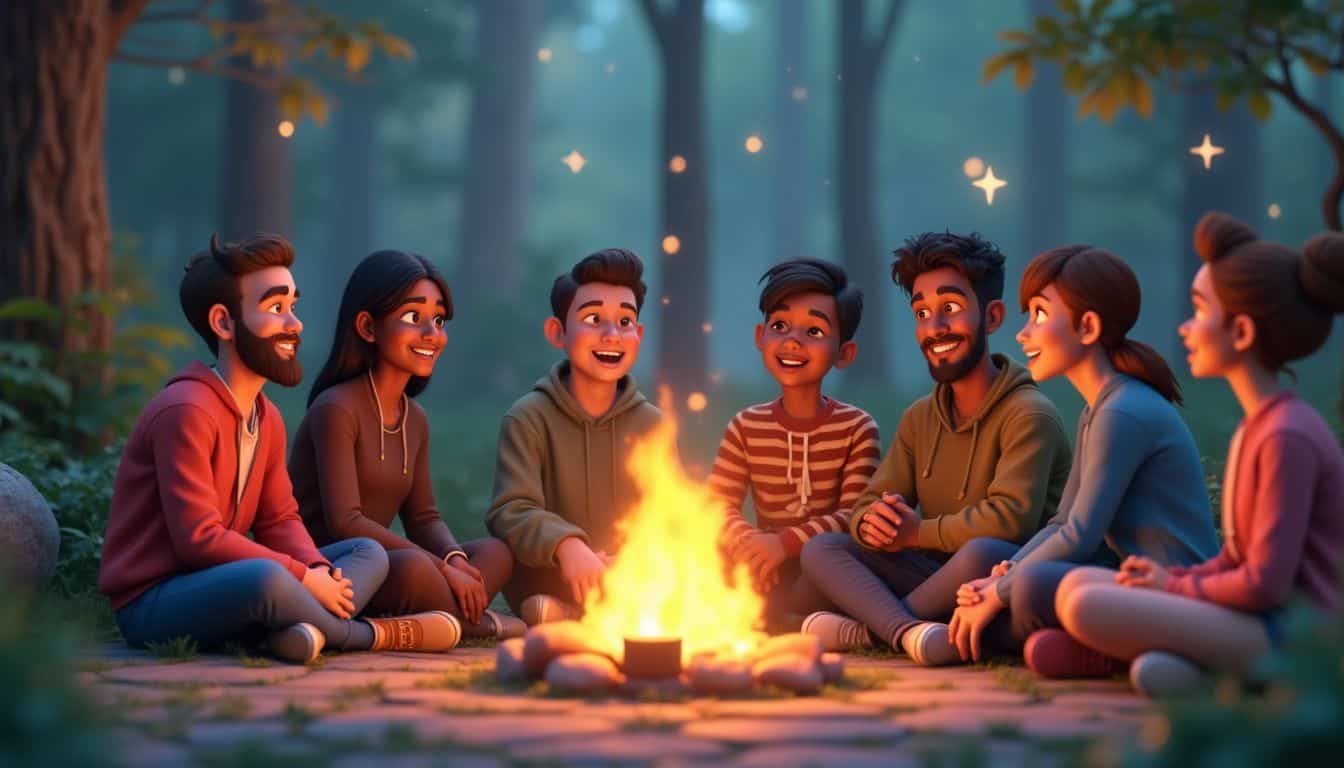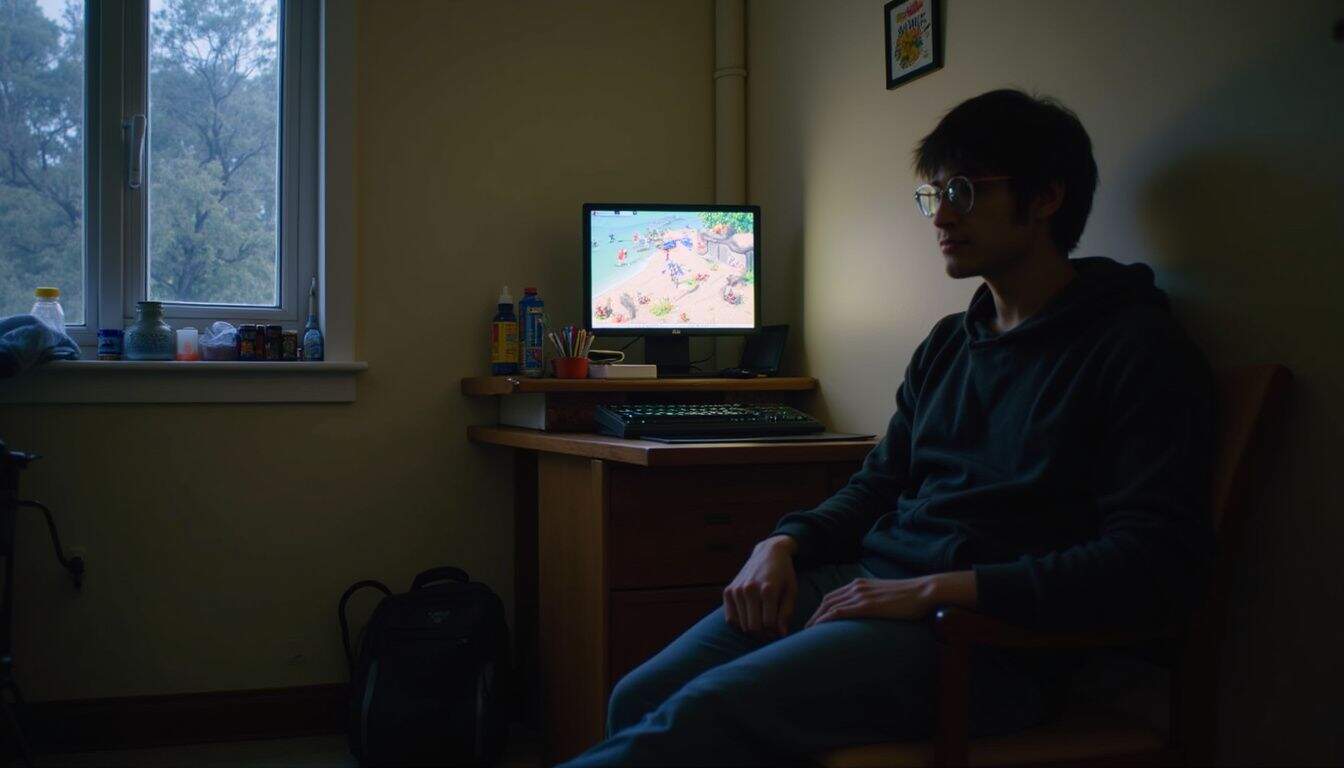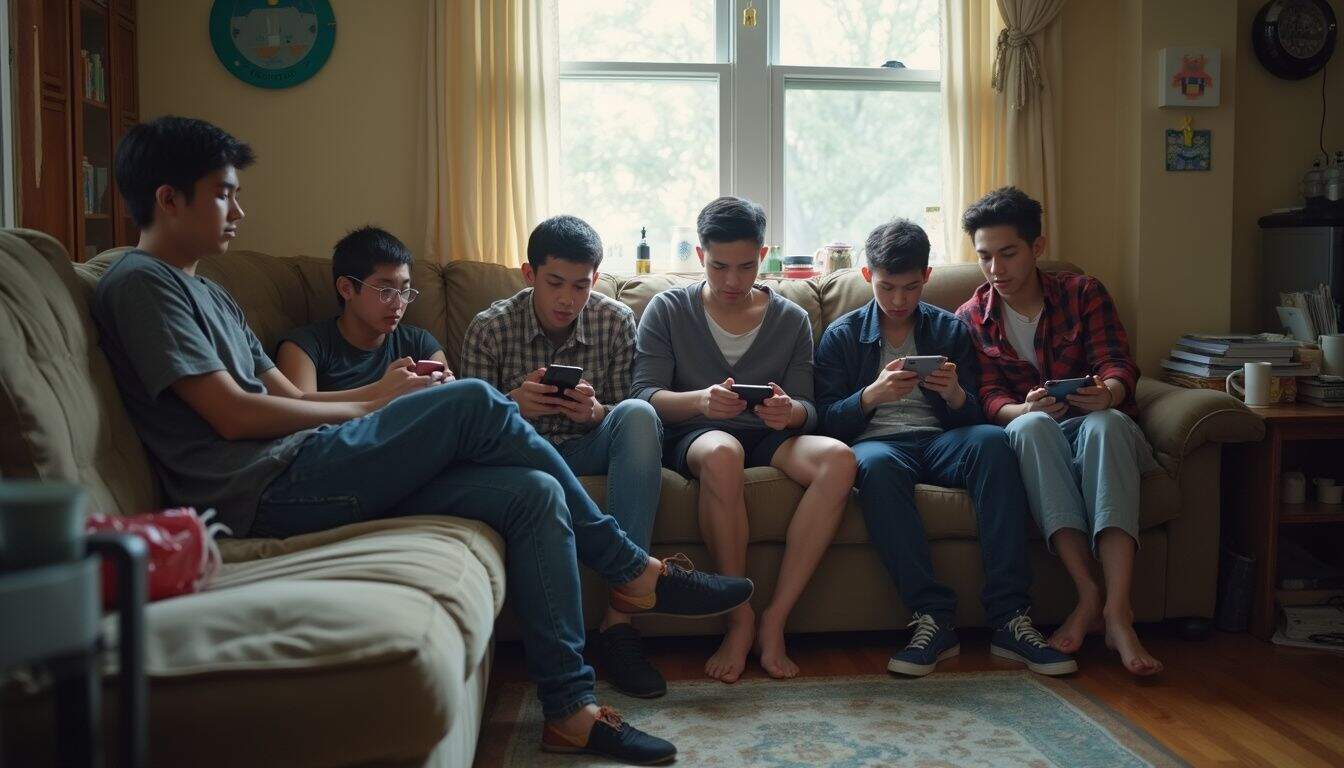Ever wonder if all those hours you’ve spent grinding in a game actually do anything for you in the real world? It’s a fair question, and the answer is a resounding “yes.”
In fact, a huge global survey in 2025 by the Entertainment Software Association (ESA) confirmed what many of us already felt: a majority of players credit gaming with developing skills like problem-solving, teamwork, and critical thinking. Research from 2022 and 2023 backs this up, showing that the positives of online games include boosting memory, attention, and even social skills.
So, let’s talk about the real wins you get from gaming.
I’m going to walk you through how strategy games, multiplayer modes, and virtual teamwork can genuinely help with personal growth and sharpen your communication skills.
Key Takeaways
A 2022 study of nearly 2,000 children found that those who played three or more hours of video games daily scored higher on memory and attention tests than non-gamers.
Multiplayer games like League of Legends and Minecraft foster social growth, cultural awareness, and teamwork. According to a 2024 Pew Research study, almost half of U.S. teens say video games have helped them make and maintain friendships.
Online gaming sharpens motor skills and hand-eye coordination. A study by Oxford University revealed that gamers have up to 30% faster reaction times in tasks requiring this skill compared to non-gamers.
Family gaming on platforms like the Nintendo Switch can strengthen communication. A landmark 2024 study from Osaka University found that owning a Nintendo Switch significantly improved mental well-being among adolescents.
Games provide serious emotional benefits. A 2023 ESA report found that 71% of gamers felt less stressed while playing, helping to boost confidence, foster resilience, and offer a safe social space.
Table of Contents
Cognitive Benefits of Online Games

Online games can light up your brain in some pretty amazing ways. Whether you’re solving a complex puzzle or just enjoying some casual fun, you’re giving your mind a real workout.
For example, even playing on an online casino in Canada can sharpen your pattern recognition. My cousin once hit a personal best and could recall every winning combination for weeks afterward.
How do online games enhance strategic thinking?
If you’ve ever spent a night building a civilization from scratch or managing a colony on a hostile planet, you know that survival and sandbox games teach strategic planning better than any textbook.
Massive multiplayer online battle arenas (MOBAs) like Dota 2 or League of Legends are intense mental exercises. You have to juggle resource management, map awareness, and make lightning-fast decisions.
Fast-paced titles, like real-time strategy classics, train you to adapt your tactics on the fly. As my friend Jake once said during a late-night Starcraft session, “If you’re not adapting, you’re losing.” That has always stuck with me.
A 2024 study from the University of Houston found that MMO gamers, in particular, learn to see work-related issues as solvable puzzles, which improves their patience and encourages them to persevere in finding solutions.
This kind of game-based learning is also making its way into classrooms. It helps students quickly gather information and make smart choices under pressure, with research from 2022 linking strategy MMOs to improved problem-solving skills in teens.
In what ways do online games improve problem-solving skills?
Every session of an adventure game or a massively multiplayer online game is essentially a series of puzzles and obstacles to overcome. You learn to think on your feet, spot hidden clues, and devise creative strategies to clear a level or defeat a boss.
This isn’t just a feeling, it’s backed by data. A 2024 Pew Research study confirmed that 56% of teen players believe video games have actively strengthened their problem-solving abilities.
Here are a few ways games build these skills:
- Immediate Feedback: Games let you know instantly if a strategy worked or failed. This trial-and-error loop is a powerful way to learn and adapt.
- Creative Tactics: Open-ended games like Minecraft encourage you to experiment with unconventional solutions.
- Team Collaboration: Multiplayer games require you to communicate, plan, and execute strategies as a team, building both empathy and smart collaboration.
I once spent hours just replaying levels in a game to find the perfect skill combination for my character. That process trained my brain for flexible thinking and mental rotation, skills that are incredibly useful outside of gaming.
Can online games boost memory and attention span?
Yes, and there’s solid science to prove it. A 2022 study of almost 2,000 children found that those who gamed for about three hours a day performed better on cognitive tests related to memory and attention compared to non-gamers.
Functional MRI scans from that same study showed increased brain activity in regions responsible for working memory and focus, especially in the kids who played regularly.
Games that require quick decisions or puzzle-solving push your brain to maintain concentration. This constant challenge improves your processing speed and impulse control. Even educational titles can help young children develop memory skills, especially when parents are involved in guiding their screen time with parental controls.
How do online games sharpen visual focus and spatial awareness?
Action games like Portal or sandbox games like Minecraft throw you into complex 3D environments where every detail matters. You train your brain to spot moving objects, identify patterns, and react to visual cues in seconds.
Research has shown that this type of play can increase spatial reasoning skills and even lead to a measurable increase in the brain’s gray matter.
Simulation games also provide a serious workout for your visual focus.
- In Microsoft Flight Simulator, you have to guide a plane through changing weather conditions, relying on sharp visual input.
- Early learning games like Endless Alphabet help preschoolers build spatial awareness by recognizing letters and patterns.
Many gamers report that these sharpened skills translate to the real world, improving everything from navigating a new city to better visual-motor coordination.
Skill-Based Advantages

Beyond just making your brain sharper, online games can make your hands and reflexes faster than a streamer dodging spoilers. Let’s look at how.
How do online games improve hand-eye coordination?
In fast-paced games, your fingers have to move in perfect sync with what you see on screen. A session of Fortnite or Call of Duty is an intense workout for your fine motor skills.
Every action, from aiming a weapon to dodging an attack, requires tight teamwork between your hands and eyes. This turns hand-eye coordination into a refined art form, building serious muscle memory with every match. As any streamer will tell you, “Precision actions lead to big wins.”
This skill isn’t just for gaming. Research has shown that surgeons who play video games often perform better in simulations, and these sharpened reflexes can be applied to everyday tasks.
What multitasking skills can be developed through online games?
Gamers are master multitaskers. In any given match, you might be tracking a map, communicating with teammates, managing resources, and making split-second decisions all at once.
Studies show that gamers can switch between tasks more efficiently than non-gamers because their brains are trained to handle a higher cognitive load. In strategy games, you have to learn new rules while processing information from multiple sources at once.
This ability also builds valuable soft skills. When you team up with players from different countries, you gain cross-cultural awareness and learn to communicate effectively across different backgrounds.
How do online games enhance motor skills and manual dexterity?
Fast-paced online games are a secret workout for your hands, demanding incredible fine motor control. Clicking, tapping, and maneuvering joysticks with speed and precision all help boost manual dexterity.
I remember trying to shave milliseconds off my response time in Overwatch. After weeks of practice, my muscle memory had improved dramatically. The immersive nature of these games means you’re practicing specific motor tasks over and over, building precision much like a musician.
A 2024 University of Houston study found that skills learned in massive multiplayer online games, like coordinating complex tasks and respecting team norms in titles like World of Warcraft and Final Fantasy XIV, directly enrich skills in the workplace.
This focused, repetitive activity shapes your muscle memory in surprising ways, supporting psychological development and helping with anxiety management for many players.
Social Benefits of Online Games

One of the biggest positives of online games is their ability to bring people together. Players from different countries, backgrounds, and cultures can connect, share stories, and build real friendships without ever leaving home.
How do online games help connect people globally?
People from all over the world meet and form communities through multiplayer games. During the COVID-19 lockdowns, my own friend group used MMOs and MOBAs to stay connected.
We ended up playing with people from Germany, Brazil, and South Korea, and we didn’t just trade banter, we shared parts of our culture and history, too.
Global chat and voice channels allow players to exchange ideas and form genuine friendships. These social platforms build trust as players cooperate to achieve a win or offer compassion when someone is struggling with lag (we’ve all been there).
Sometimes I learned more about geography arguing over where teammates lived on Discord than I did at school.
Game communities often become safe spaces for kids and adults who might struggle with shyness in person. Each session can be a mini-lesson in cultural awareness, a type of blended learning you won’t find in a textbook.
How do online games build teamwork and communication skills?
Think of a multiplayer match as a high-speed group project, just with more lasers and fewer boring presentations. Players gather in chat rooms, use ping systems on maps, and share tactics to secure a win. These interactions are fantastic for sharpening teamwork, negotiation, and communication skills.
In role-based games like League of Legends or Overwatch, clear communication is essential. Each player has a specific job, and success depends on everyone working together. This environment teaches you to listen and speak clearly under pressure.
Kids with disabilities often find that online co-op games provide an accessible way to experience teamwork and socialization without judgment. Players learn pro-social behaviors as they cheer on teammates and adapt their own playstyle for the good of the group.
In what ways do multiplayer games foster cooperation?
In games like Glory of Kings or co-op masterpieces like It Takes Two, you simply can’t win without your teammates. These games are designed to require real teamwork, forcing players to share resources, communicate strategies, and support each other.
Many games create tasks that are impossible for one person to complete alone, making collaboration vital.
This often involves personal sacrifice, like when a player heals a teammate instead of trying to score points themselves. This fosters a strong sense of community and belonging, motivating players to support each other and sometimes sparking real-life friendships.
How do online games provide a safe space for shy individuals?
For shy or introverted people, online games can feel like a social sanctuary. The visual anonymity of using an avatar can remove the stress of face-to-face interactions.
This creates a sense of emotional safety. People with high emotional sensitivity often report making more friends online than they do offline. Multiplayer lobbies can become “third places,” like a digital coffee shop, where you can chat or just observe at your own pace.
I used to be nervous about speaking up in a crowded room, but chatting online with just a gamer tag made it so much easier. You control the pace of conversation and who you interact with. For many, these digital hangouts help ease the anxiety of real-life meetups and boost happiness.
Emotional Benefits of Online Games

Beyond the social and cognitive boosts, online games can have a powerful positive impact on your emotional well-being. They can lift your mood, give you a sense of accomplishment, and even help you practice mindfulness.
How can online games boost confidence and self-esteem?
Finally beating that boss after hours of trying is a feeling like no other. Each challenge you overcome and puzzle you solve builds confidence, which is especially valuable for people dealing with social anxiety or other mental health challenges.
Games provide rapid feedback and rewards. I still remember the feeling of my first trophy popping up on PlayStation, it felt better than acing a test at school! This cycle of trying, failing, and eventually succeeding helps build resilience in a natural way.
Healthy competition often leads to new friendships, and even just chatting with teammates on Discord can be a low-pressure way to improve communication skills and boost your self-esteem.
Can online games provide stress relief and relaxation?
Absolutely. A 2023 report from the Entertainment Software Association found that 71 percent of gamers felt less stress while playing. Online games can act as a pressure valve, offering an escape after a long day.
During the pandemic, many people turned to online games for comfort and connection, which helped reduce feelings of isolation and strengthened social ties. A landmark 2024 study by Osaka University even found a causal link between gaming and improved mental well-being, especially for those who owned a Nintendo Switch during that period.
Multiplayer games create a space to belong, and cozy games like Animal Crossing or Stardew Valley can be a great way to unwind. Many gamers describe their favorite game as their go-to reset button when they feel overwhelmed.
How do rewards and achievements in games offer a sense of accomplishment?
Earning that rare loot drop or unlocking a special achievement feels like a real win. Games are full of goals to chase, and hitting them provides a clear sense of satisfaction and pride.
This reward system is designed to release a burst of positive feelings, which can help shake off stress or boredom. As someone who has spent more hours than I’d like to admit grinding for a rare achievement badge, I can confirm that those digital trophies provide a genuine mood boost.
This structured system of goals and rewards helps build a sense of competence that can carry over into how you approach real-world tasks.
Educational Potential in Online Games
Online games are increasingly being used as powerful educational tools. By using gamification, they can make subjects like math and science more engaging. Players practice critical thinking by solving puzzles or making quick choices in games like Minecraft Education Edition and Kahoot!
How does learning through gamification work in online games?
Gamification turns learning into a game by adding elements like points, badges, and leaderboards. Players earn rewards for completing tasks, and progress bars show them how close they are to mastering a new skill. Platforms like BrainCert use these features to make professional training more motivating.
I once got hooked on a game that taught coding through puzzles. Competing with my friends on the leaderboard made it far more exciting than a traditional class.
These features give learners a sense of autonomy while building competence, something every geek loves as much as finding good creative commons resources.
How do online games encourage critical thinking and decision-making?
Game-based learning lays the foundation for deep, analytical thought. A 2023 survey found that 53% of players use reflective thinking as their primary style of strategy in games.
I remember playing League of Legends and feeling my brain race to weigh my next move against the needs of my four teammates. That pressure forces you to balance quick reactions with careful planning.
Multiplayer games like World of Warcraft demand teamwork and skillful coordination, building skills that go far beyond just your character’s stats. This is why many companies are now using games like Minecraft Education Edition or Roblox Studio for corporate training, allowing employees to practice making smart choices under pressure without real-world risks.
How do online games promote creative problem-solving?
Open-world games like Genshin Impact and sandbox favorites like Roblox are all about experimentation and invention. The tasks in these games rarely have a single correct answer.
Players are encouraged to combine tools in new ways and adapt their tactics on the fly. I once built a ridiculously complex contraption in Roblox to solve a puzzle, no tutorial, just pure trial and error. It felt like composing music with notes I’d just discovered.
Research confirms this link. In 2023, students who played open-world online games showed higher scores in problem-solving activities than their peers. These platforms teach you to try, fail, and adapt, which is like leveling up your own imagination.
Health and Well-being Benefits
Some online games are like a high-speed workout for your brain. Titles that focus on puzzles or team strategy can boost your mood and keep your mind sharp.
How do online games improve mental agility?
Online games constantly throw you into fast-paced challenges that demand quick thinking. A study from Western University found that people who frequently play video games (five or more hours a week) performed on cognitive tests like people who were, on average, 13.7 years younger.
Engaging in strategy games like League of Legends or puzzle games like Portal helps your mind practice juggling multiple pieces of information while staying alert.
Even taking short gaming breaks can be beneficial. After 60 to 90 minutes of intense focus on work, a round or two of a game can help lower cortisol levels and refresh your mental energy.
In what ways do online games support emotional resilience?
Games like Among Us or Animal Crossing offer a fun, low-stakes way to unwind. Losing a digital battle might sting for a moment, but most gamers just dust themselves off and hit restart. Over time, this simple act builds a thicker skin and fosters real-world grit.
During challenging times, like the 2020 pandemic lockdowns, games like Minecraft provided a vital source of connection and comfort. Chatting with friends during a multiplayer session can shrink feelings of loneliness and provide emotional backup after a tough day.
Many players use gaming marathons or chat lounges on Discord to release pent-up emotions. As the stress melts away, your mind becomes sharper and more ready to learn new skills.
How do online games stimulate brain activity?
Online games put your brain cells into overdrive by demanding sharp attention and fast reactions. Quick-time events, like dodging an attack in Hades, force your brain to focus on visual cues and improve visuomotor skills.
Scientific studies have shown that regular gaming can actually increase gray matter in the brain. This is the part of the brain responsible for memory, muscle control, and decision-making.
Puzzle games like Portal or Tetris work different mental muscles, challenging you to plan ahead and solve problems under pressure. I remember struggling with a tough boss in Celeste. Beating it required intense concentration and split-second choices. My head felt sore in a good way afterward. These mental workouts make your brain work smarter and faster with every session.
Family-Friendly Gaming Experiences
Playing games like Overcooked!, Jackbox Party Pack, or Animal Crossing together can bring families closer and turn screen time into quality time. Curious how? Let’s take a look.
How can cooperative games encourage family bonding?
Cooperative games are designed for teamwork. They bring parents, kids, and even grandparents together to solve problems as a single unit. Everyone has to contribute their unique strengths to succeed.
Platforms like the Nintendo Switch and PC are full of titles like Overcooked! and Minecraft that demand collaboration. A family game night with one of these titles can turn the living room into a command center filled with laughter and focus.
Because the goal is shared, successes feel sweeter, and there’s less room for arguments. Research shows that this kind of play helps both children and adults develop social skills and emotional well-being together.
What opportunities do online games offer for parents to engage with children?
Joining your kids for a gaming session can be a fantastic way to bridge the generation gap. Popular games like Minecraft and Mario Kart are perfect for co-play.
Parents get a front-row seat to their child’s digital world, and kids love showing off their skills. This shared activity naturally opens the door for conversations about safe online behavior and handling toxic players without it feeling like a lecture.
Research shows that family gaming is linked to better teamwork and communication skills for everyone. Girls, in particular, tend to show more prosocial behaviors when parents join in on collaborative missions.
How do online games promote positive shared experiences?
Family-friendly games like Heads Up! on mobile or Tricky Towers on console are great for a laugh. The lighthearted competition brings everyone together and creates lasting inside jokes.
For families separated by distance, virtual spaces can keep connections strong. Meeting up in a game to complete a quest or just explore a world together can be a meaningful way to spend time, even when you’re miles apart.
Even watching “Let’s Play” videos on YouTube or joining a live stream can become a shared activity, giving everyone something new and exciting to talk about at the dinner table.
Positive Impact on Personal Growth
Online games are a training ground for real-life challenges. They push you to react quickly, think on your feet, and develop a level of grit that’s useful in any situation.
How do online games enhance decision-making under pressure?
In fast-paced games like League of Legends and Overwatch, you have to make split-second decisions constantly. If you miss a single cue, your whole team could lose the match. This environment sharpens your ability to analyze a situation, adapt your plan, and execute under stress.
I noticed that after a few weeks of playing Valorant regularly, my ability to handle pressure in my work life improved. Studies have shown that motivated players experience more creativity during high-pressure moments in a game, and that innovative thinking can carry over into the real world.
Can online games help develop time management skills?
Yes, especially in games with structured missions and daily challenges. These games teach you how to plan, prioritize, and manage your time effectively. Many gamers schedule their play hours to hit deadlines for in-game events, like raid nights in World of Warcraft or seasonal quests in Fortnite.
With good parental guidance, kids can learn to balance their gaming time with homework and other responsibilities. Strategy games and team-based shooters demand focus and scheduling, pushing players to set goals and juggle tasks to get the best results.
How do online games encourage perseverance and adaptability?
Facing a tough level in a game like Elden Ring or a complex build in Minecraft demands real grit. You’ll hit roadblocks, fail quests, and lose battles. But sticking with it and eventually succeeding builds mental muscle.
Modern games are also constantly changing. A new patch or season in a game like Fortnite can introduce fresh rules and different mechanics. Players have to adapt on the fly, tweaking their strategies and learning new ways to win.
This process of learning from both wins and losses teaches adaptability and a never-quit attitude that is invaluable in real life.
Competitive Opportunities in Online Games
The world of competitive gaming has exploded. Tournaments on platforms like Twitch and Discord now attract millions of viewers and offer huge prize pools, turning a hobby into a potential career.
How do online games encourage healthy competition?
Multiplayer games provide a structured environment for rivalry and friendship to coexist. Players can test their skills, climb leaderboards, and aim to win matches, all while collaborating with teammates from across the world.
This kind of healthy competition pushes you to sharpen your tactics and improve your skills. Game communities often cheer each other on and share tips, creating a supportive atmosphere.
Learning to handle both wins and losses with grace is a key life skill. I’ve found that match nights with friends are a great way to practice this, even if it’s just for bragging rights!
What platforms do online games provide for esports and tournaments?
Games like Fortnite and Rocket League have built-in systems for esports events where skilled players can compete for global recognition. Beyond the games themselves, several major platforms support the competitive scene:
- Twitch and Discord: These are the social hubs where communities gather, events are organized, and top-tier skills are showcased.
- Battlefy and FACEIT: These platforms provide the infrastructure for tournaments, including matchmaking, brackets, and live stat tracking.
- ESL Gaming: This is one of the largest esports organizers in the world, hosting professional leagues and massive international tournaments.
The esports industry is booming. By 2023, the total prize pool for esports had already surpassed $500 million, and it continues to grow, offering a real career path for dedicated players.
How do online games foster goal-setting and achievement?
Games like Fortnite and League of Legends are built around clear objectives. Each quest, level, or tournament gives you a target to aim for, whether it’s earning a certain number of points or completing a raid with your squad.
Achieving these goals requires focus, planning, and a lot of practice. Leaderboards drive friendly competition and motivate you to climb to higher ranks.
Earning digital trophies or unlocking milestones provides instant, positive feedback. This reward cycle boosts your confidence and fuels your motivation for the next challenge, all while sharpening your decision-making skills under pressure.
Tips for Maximizing the Benefits of Online Games
Ready to get the most out of your playtime? With a few smart choices and healthy habits, you can make sure you’re getting all the good stuff from your gaming sessions.
How do you choose age-appropriate and engaging games?
Always check the PEGI or ESRB ratings on a game before diving in. These labels and parental guides give you a clear idea of the content, so you can avoid anything that’s too mature or violent for younger players.
I once downloaded a strategy game that looked fine, but the user reviews warned about hidden jump-scares. Now, I always read reviews first.
To keep things engaging, pick games that align with a person’s interests. If your kid loves puzzles, they’ll probably enjoy Tetris Effect. If they’re creative, Minecraft is a great choice. You can find different [types of online games](https://www.geekextreme.com/different-kinds-of-online-games/) to match just about any hobby.
What is the best way to balance gaming time with other activities?
Setting a timer or using the parental controls on a console is a simple way to keep track of screen time. Many families find success by scheduling gaming hours after homework or chores are done.
Even better, make gaming a social activity. Playing multiplayer games with your kids makes it easier to monitor their habits and strengthens your connection.
Encourage mixing gaming with other hobbies. Active games like Pokémon GO or rhythm games on the Nintendo Switch can get you moving. Regular breaks are key to preventing fatigue and keeping the fun alive.
Why are breaks important to maintain focus and enthusiasm during gaming?
Taking regular breaks, even just for a few minutes every hour, is crucial for preventing gaming fatigue. I once tried to power through a marathon session of Minecraft and after a couple of hours, even simple tasks felt like rocket science.
A short pause gives your brain a chance to reset. Get up, walk around, or grab a snack. A little physical activity can pump fresh energy back into your brain and muscles.
Breaks are also great for managing strong emotions. If you’re feeling frustrated after a tough loss in League of Legends, stepping away for a few minutes can make all the difference. This simple habit helps ensure that gaming remains a fun and positive part of your life.
How Will the Benefits of Online Games Evolve in 2025?
Looking ahead, the positives of online games are only going to expand. In 2025, we’ll likely see even more families gaming together, with titles like Minecraft and Roblox continuing to serve as platforms for learning and connection.
Last year, I built an entire digital city with my nephew. He learned about history and math, while I got a refresher in patience and quick thinking.
Multiplayer games will continue to be a training ground for teamwork and perseverance. Friends from all over the world will keep practicing clear communication and strategy in virtual worlds.
Esports will also continue its massive growth, providing a space for young gamers to learn sportsmanship. And with advancements in AI, we can expect educational games to become even better at adapting to each player’s unique learning style, making them more effective than ever.
People Also Ask
How do online games help with brain development?
Games like Portal 2 are proven to sharpen spatial reasoning skills, while a University of Rochester study confirmed that fast-paced titles can speed up your decision-making by as much as 25%. They train your brain to process visual information more efficiently and solve complex problems under pressure.
Can online games improve real-world skills?
Yes, managing a guild in a game like World of Warcraft or running a virtual corporation in EVE Online directly teaches leadership and resource management. These complex social systems often mimic real-world project management, building valuable skills for your career.
Do online games support social growth?
Absolutely, a 2023 study by the Entertainment Software Association found that over half of all players have made new friends through online games. Platforms like Discord and in-game guilds create tight-knit communities where people build genuine, lasting connections.
Are there social wins for families who play together?
Definitely, as co-op games like Overcooked and Stardew Valley create a fun space for shared problem-solving and build hilarious memories that strengthen family bonds.
References
https://www.sciencedirect.com/science/article/abs/pii/S1875952124000624
https://www.westeamahead.org/blog/2023/9/22/the-power-of-play (2023-09-22)
https://builtin.com/articles/online-gaming-social-benefits
https://www.nih.gov/news-events/news-releases/video-gaming-may-be-associated-better-cognitive-performance-children (2022-10-24)
https://www.mdpi.com/2076-3425/14/12/1269
https://pmc.ncbi.nlm.nih.gov/articles/PMC8293336/
https://learnfully.com/the-top-ten-positive-impacts-of-video-gaming/
https://www.npr.org/2010/12/20/132077565/video-games-boost-brain-power-multitasking-skills (2010-12-20)
https://www.researchgate.net/publication/365324113_How_Online_Gaming_Could_Enhance_Your_Career_Prospects (2022-11-12)
https://www.researchgate.net/publication/284491180_The_educational_benefits_of_videogames (2025-08-10)
https://pmc.ncbi.nlm.nih.gov/articles/PMC9047596/
https://pmc.ncbi.nlm.nih.gov/articles/PMC12137278/
https://pmc.ncbi.nlm.nih.gov/articles/PMC4080869/
https://chromaticdreamers.com/how-video-games-build-confidence/
https://pmc.ncbi.nlm.nih.gov/articles/PMC3978245/
https://blog.braincert.com/the-importance-of-gamification-in-online-learning/ (2023-05-10)
https://jcls.org/2023/07/18/emotional-benefits-to-playing-video-games/ (2023-07-18)
https://pmc.ncbi.nlm.nih.gov/articles/PMC8277305/
https://health.clevelandclinic.org/are-video-games-good-for-you
https://elegantsi.com/blog/family-game-night (2024-08-19)
https://pmc.ncbi.nlm.nih.gov/articles/PMC9998671/
https://www.internetmatters.org/advice/by-activity/online-gaming-advice-hub/online-gaming-benefits/
https://www.nature.com/articles/s41599-025-04690-6
https://escharts.com/news/guide-services-matchmaking-tournaments (2023-09-22)
https://www.nerdly.co.uk/2025/07/07/top-9-tips-to-balance-gaming-with-other-hobbies/
https://vocal.media/journal/the-cognitive-benefits-of-short-gaming-breaks-in-the-workplace
